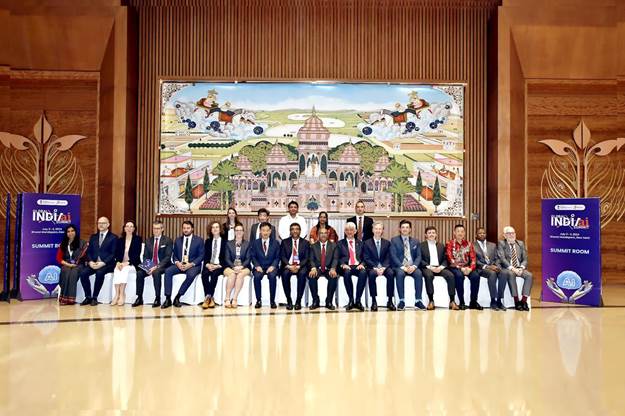Members of GPAI reach a consensus over the organization’s future direction: to enable a fresh integrated partnership to fully utilize AI’s potential for everyone’s benefit.
On July 3, 2024, in a hybrid format, the GPAI Ministerial Council convened for its sixth meeting at Bharat Mandapam in New Delhi. Hon. Jitin Prasada, Minister of State for Electronics and Information Technology, Commerce & Industry, presided over the meeting. The meeting was also addressed by Hon. Minister from Serbia, Ms. Jelena Begovic, and Hon. Vice Minister from departing chair, Japan, Shri Hiroshi Yoshida. Dr. Tawfik Jelassi, Assistant Director General of UNESCO, and Jerry Sheehan, Director of Science, Technology, and Innovation at the OECD, were also present at the conference.
The members reached a consensus over the future direction of the Global Partnership on Artificial Intelligence (GPAI) following protracted talks and considerations. The following are the main ideas of the future vision:
1. Acknowledge the impact artificial intelligence (AI) will have on our economies and societies in the future, the opportunities that reliable, safe, and secure AI systems will present to advance sustainable development and speed up progress in that direction, and the significance of concerted global efforts to fully utilize AI;
2. Recognize the new risks and difficulties that artificial intelligence (AI) systems, especially sophisticated AI systems, present. These include issues with safety and security and potential malicious uses; misinformation and disinformation; harmful biases that lead to discrimination; a lack of transparency and fairness; an uneven playing field; risks to intellectual property and personal data protection; dangers to children’s rights and well-being; risks to environmental sustainability and democratic values; and changing the nature of work in the future.
3. Agree to strengthen collaboration between governments, academia, researchers, the technical community, the private sector, and civil society, including from developing and developed economies, in order to foster reliable and human-centered AI through an inclusive, multi-stakeholder approach based on a solid scientific foundation, open solutions, and common standards.
4. Reaffirm our shared support for the UNESCO and OECD recommendations on AI ethics and artificial intelligence, respectively.
5. Keep in mind that the Global Partnership on Artificial Intelligence has been a singular endeavor for worldwide multi-stakeholder collaboration on AI since its founding.
6. Acknowledge the New Delhi 2023 GPAI Ministerial Declaration, in which we reaffirmed our commitment to pursuing a diverse membership, with a focus on low- and middle-income countries in order to ensure a broad range of expertise, national and regional views, and experiences based on our shared values; and expressed our commitment to strengthening GPAI’s distinct and independent identity as a nodal initiative that plays a key role in global cooperation on AI innovation and governance;
7. Take note of the joint efforts of the Executive Council, the GPAI Secretariat, and the “Small Working Group for Future of GPAI” in conceiving the organization’s future as well as its governance and operating procedures.
8. Express gratitude to OECD for its ongoing support of GPAI since its founding and reiterate our shared resolve to build GPAI and OECD synergies for the growth of human-centric, secure, reliable, and safe AI.
9. Declare a new direction for GPAI based on the OECD Recommendation on Artificial Intelligence and an integrated collaboration with the OECD that unites all present OECD members and GPAI countries on an equal basis under the GPAI brand.
10. Invite all nations to join us in this cooperative effort to maximize the promise of human-centric, reliable, safe, and secure AI for the benefit of all, irrespective of their existing membership status in the OECD or GPAI.
11. Look forward to collaborating on an as-needed basis through an inclusive conversation with pertinent international organizations, United Nations Specialized Agencies, and other partners.
12. Stress that the integrated partnership’s members shall agree by consensus regarding the partnership’s work priorities and the admission of new members and observers.
13. Stress that every partner in the integrated partnership will take an equal and nondiscriminatory part in the partnership’s operations and decision-making.
14. Reaffirm that as the partnership’s governing bodies, the Council, Plenary, and Steering Group, we will work to guarantee inclusive governance at all levels of the partnership.
15. Agree to preserve and strengthen GPAI’s multi-stakeholder nature and to improve member-expert collaboration, in part by utilizing the active role of GPAI Expert Support Centers (ESCs) and by combining the OECD Network of Experts on AI (ONE AI) and the GPAI Multistakeholder Expert Group (MEG) along with their current expert/working groups into a single expert community within the partnership.
16. Take note that the integrated partnership may, by consensus, examine developing its unique working procedures based on the equal standing of all members, regardless of their membership status with the OECD.
17. Take into account how crucial it is to use international cooperation and integrated partnerships to close the digital gaps that exist within and between nations, to advance safe, trustworthy, and secure AI, and to foster collaboration with AI initiatives introduced in other international forums like the G20 and G7, such as the Council of Europe, the Hiroshima AI Process, the 2023 Bletchley Park AI Safety Summit, the 2024 AI Seoul Summit, and the forthcoming 2025 France AI Action Summit;
18. Declare our intention to keep up positive communication via the integrated partnership in order to realize our common vision of an AI-powered future that benefits everyone, leaves no one behind, and fosters sustainable development, peace, and prosperity.
19. Appreciate the Lead Chair of GPAI for 2024–2025 being elected by GPAI members of Serbia and anticipate the GPAI Summit in Serbia later this year.
India’s leadership in the global AI conversation is emphasized by the 2024 GPAI New Delhi meeting and the consensus established on the organization’s future. This reinforces India’s critical role in guiding the ethical and inclusive development of AI.
This will make it easier for the reestablished integrated partnership to accomplish its goals of utilizing AI’s potential for everyone’s benefit.
